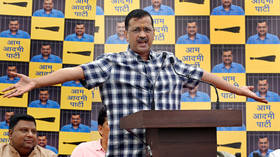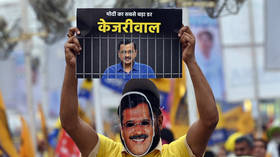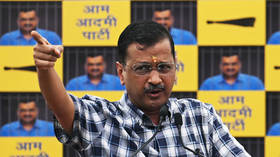Indian opposition leader’s bail turned down moments before release

The Delhi High Court on Friday suspended a trial court order which had granted bail a day earlier to Arvind Kejriwal, the chief minister of India’s national capital region, who leads the opposition Aam Aadmi Party (AAP).
Kejriwal was arrested in March, weeks before the general election, on corruption charges in an alleged liquor scam linked to excise policy. The politician has not been convicted – hearings in the case continue while Kejriwal remains acting chief minister of Delhi.
On Thursday, a court ordered Kejriwal’s release on a personal bond of 100,000 rupees (around $1,200). The conditions included not interfering with the investigation or influencing witnesses in the case.
However, hours after bail was granted, the Enforcement Directorate (ED), a domestic economic intelligence agency, moved the High Court to oppose the possibility of bail. The final order is expected to be announced early next week, Indian media reported.
Hours before Kejriwal walked out, the Enforcement Directorate (ED), a federal financial-crime fighting agency that had initially arrested him in March, challenged his bail.
The trial court which granted bail to the CM had earlier observed that the ED failed to give direct evidence linking Kejriwal to the “proceeds of crime” and failed to establish his guilt. The ED, however, claimed that bail was awarded without granting the directorate an adequate opportunity to present its arguments.
Kejriwal was arrested over corruption allegations related to Delhi’s now-scrapped liquor policy. The ED alleges that Kejriwal received kickbacks from liquor sellers, which he used to fund the party’s election efforts in southern India’s Goa.
The opposition leader has denied the allegations and claims he is being persecuted by Prime Minister Narendra Modi’s Bharatiya Janata Party (BJP).
Notably, Kejriwal was granted temporary bail by the Supreme Court of India in May – to conduct election campaigning amid the recently concluded general election. He returned to custody on June 2, a day after the last phase of polling concluded.
The Kejriwal-led AAP is a part of the Indian National Developmental Inclusive Alliance (INDIA), the opposition bloc that defied expectations by grabbing over 200 seats in the 543-member Lower House.
The BJP, despite losing a clear majority, was able to form the coalition government with the help of its allies in the National Democratic Alliance (NDA).
Members of the INDIA alliance claimed the arrest was an attempt by the Modi government to deny a level playing field to the opposition. After Kejriwal’s bail was denied, senior AAP leader Sanjay Singh claimed that Prime Minister Narendra Modi had made a “mockery” of the justice system.
Where India Meets Russia: Follow and share RT India on X and Instagram














